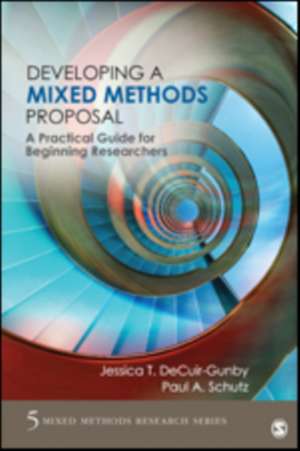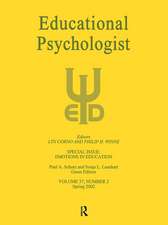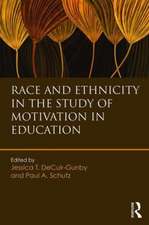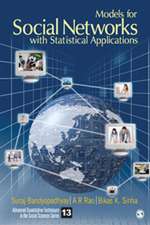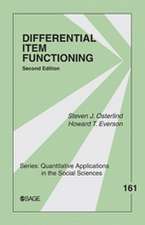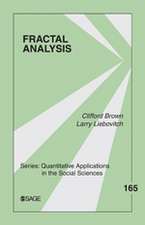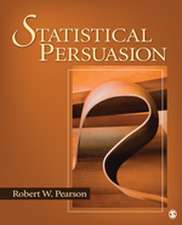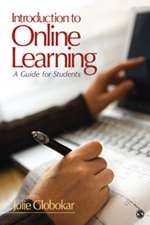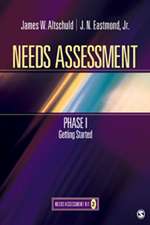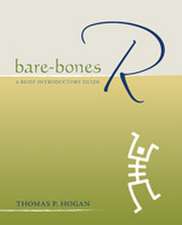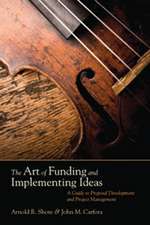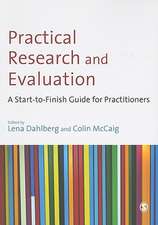Developing a Mixed Methods Proposal: A Practical Guide for Beginning Researchers: Mixed Methods Research Series, cartea 5
Autor Jessica DeCuir-Gunby, Paul A. Schutzen Limba Engleză Paperback – 15 noi 2016
Preț: 437.90 lei
Preț vechi: 492.03 lei
-11% Nou
83.80€ • 86.96$ • 70.04£
Carte disponibilă
Livrare economică 24 februarie-10 martie
Specificații
ISBN-10: 1483365786
Pagini: 288
Dimensiuni: 152 x 229 x 15 mm
Greutate: 0.39 kg
Ediția:1
Editura: SAGE Publications
Colecția Sage Publications, Inc
Seria Mixed Methods Research Series
Locul publicării:Thousand Oaks, United States
Recenzii
“This book provides the clarity of a proven design approach, so common mistakes or more often oversights don’t happen.”
“The book can serve as a reference for my students’ dissertation writing. Also, from teaching point of view, the book also provides good activities for the instructors to use in their instructions.”
We have all waited a long time for a good book on developing a mixed methods proposal. DeCuir-Gunby and Schutz have delivered this book to us. They write in clear, straight-forward language, they include the latest advances in mixed methods, they incorporate activities, further readings, and sample sessions illustrating the use of each chapter's content. I especially liked the ‘real-world’ sample proposal at the end on racial microaggressions. I will encourage workshop participants and students to study this chapter closely. This is a must-read book in the field of mixed methods.
Cuprins
What is Mixed Methods research?
What are the Advantages of Mixed Methods Research?
What should you consider when engaging in mixed methods research?
What does a Mixed Methods Research Proposal Look Like?
Practice Session
Chapter 2. The Role of Theory in Mixed Methods Research
What role does theory play in a mixed methods research proposal?
Practice Session
Chapter 3. Asking Appropriate Research Questions
The Role of Research Questions
Types of Research Questions
Creating Your Own Research Questions
Practice Session
Chapter 4. The Mixed Methods Proposal Introduction
Purpose of the Mixed Methods Proposal Introduction
Components of the Mixed Methods Proposal Introduction
Practice Session
Chapter 5. The Literature Review: Situating Your Mixed Methods Study in the Larger Context
The Role of the Literature Review
Preparing and Organizing Your Research Literature
The Components of the Literature Review
Writing the Literature Review
Conclusion
Practice Session
Chapter 6. Mixed Methods Designs: Frameworks for Organizing Your Research Methods
Learning the Language of Mixed Methods Designs
Understanding Mixed Methods Designs
Choosing a Mixed Methods Design
Visually Representing your Mixed Methods Design
Conclusion
Practice Session
Chapter 7. The Heart of the Mixed Methods Research Plan: Discussing Your Methods Section
The Role of the Research Methods Section
The Components of the Mixed Methods Research Section
Conclusion
Practice Session
Chapter 8. A Little Lagniappe…A Little Something Extra
The Supporting Sections of the Mixed Methods Proposal
Writing and Talking About Your Mixed Methods Proposal
Issues Beyond Writing the Mixed Methods Research Proposal
Conclusion
Practice Session
Chapter 9. An Example of a Real-World Mixed Methods Research: The Racial Microaggressions Study Proposal
Explanatory Mixed Methods Example
Notă biografică
Jessica T. DeCuir-Gunby, PhD is an Associate Professor of Educational Psychology and University Scholar in the Department of Teacher Education and Learning Sciences at NC State University. She serves as a faculty mentor with the multidisciplinary and inter-institutional Center for Developmental Science at the University of North Carolina, Chapel Hill. She is also an associate editor for the American Educational Research Journal. DeCuir-Gunby¿s research interests include race and racial identity development, critical race theory, mixed methods research, and emotions in education. She recently served as Co-PI on two National Science Foundation funded grants, totaling over $4.3 million: Nurturing Mathematics Dreamkeepers (DRK-12 Grant) and Peer Mentoring Summits for Women Engineering Faculty of Color (ADVANCE Leadership Award Grant). Both grants used mixed methods approaches, were multidisciplinary, and explored important issues in diversity and STEM. Her work has been featured in top-tier journals such as Educational Psychologist, Educational Researcher, and Review of Educational Research, among others.
